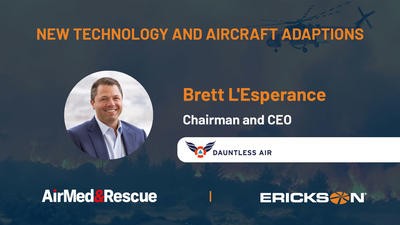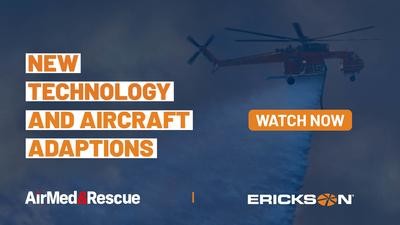Meet the aerial firefighting roundtable experts: Brian Collins, Intterra

Khai spoke with Brian Collins on the criticality of data sharing and post-incident analytics ahead of the AirMed&Rescue firefighting roundtable
** EDIT: the AirMed&Rescue Firefighting Roundtable is now available, watch the full discussion on innovation in the global fight against wildfire here **
AirMed&Rescue and Erickson have teamed up to host a firefighting roundtable discussion profiling the latest developments in aerial firefighting at a time when the service has never been more necessary.
Experts in their field from Erickson, Dauntless Air, and Intterra will bring their experience and insights to the roundtable, highlighting how adaptations to aircraft, dedicated mutual aid communications between aerial and ground operations, and more are helping to fight fires more effectively and efficiently
In the AirMed&Rescue roundtable, Brian Collins, CEO and Co-Founder of Intterra, will discuss the benefits of digital data in enhancing incident management, including how improvements in onboard data collection are enhancing post-incident analytics, enabling data sharing between organizations, and allow fire agencies to not just reflect and build on previous seasons, but manage current ones more effectively.
Data sharing has become an integral part of post-incident analysis but requires careful integration. Collins said: “Data sharing is something planned for upfront – before a mission – and is more of a cultural challenge than a time-resource challenge. The key to quality and comprehensive data collection and sharing is the balance between enabling both parties see and recognize the value of what they give and get and for that data to be easily shared.”
The processes and technology around data distribution remains in development, and key areas will need to be met before the firefighting community can get the most from digital data. Among areas to address, Collins stated: “Direct data connections between digital systems - basically standard formats for key data, comms. Let’s start with identifying the key data we want and need to share now – whether that is hazard information, fire behavior predictions, and aircraft position among so many others – and start doing it. These are all things we have now – and share sporadically – but if we define and mutually understand the need to share them, then we are halfway there.”
Although much of the US firefighting landscape varies between states, Collins is confident that data collaboration is an achievable objective. He notes: “Interestingly enough, tech can help here. The industry plays a roles in developing and adopting standards; if we build common interfaces, that will drive the communities we serve toward interoperability.”
Collins has paired his unique insight in the efficient application of diverse and disruptive technology with the pressures of emergency situations. With a background at companies including extensive background with Boeing, SRA International, and the US Marine Corp, Collins’ experience ranges from emergency management and homeland defense to advanced civil technology programs and community risk mitigation.
Intterra aims to provide fire agencies with cloud-based data visualization, insight, and analytics to help them accomplish their mission safely. These include the United States Forest Service, Ventura County, and the Western Fire Chiefs’ Association, which have each benefitted from Intterra’s collaborative big data approach.

Khai Trung Le
Khai Trung Le is Editor of AirMed&Rescue. He is an experienced science writer, having previously been embedded in Cardiff University College of Physical Sciences, Innovate UK research council, and the UK Institute of Material Sciences. His writing can also be found on Star Trek and Vice.


